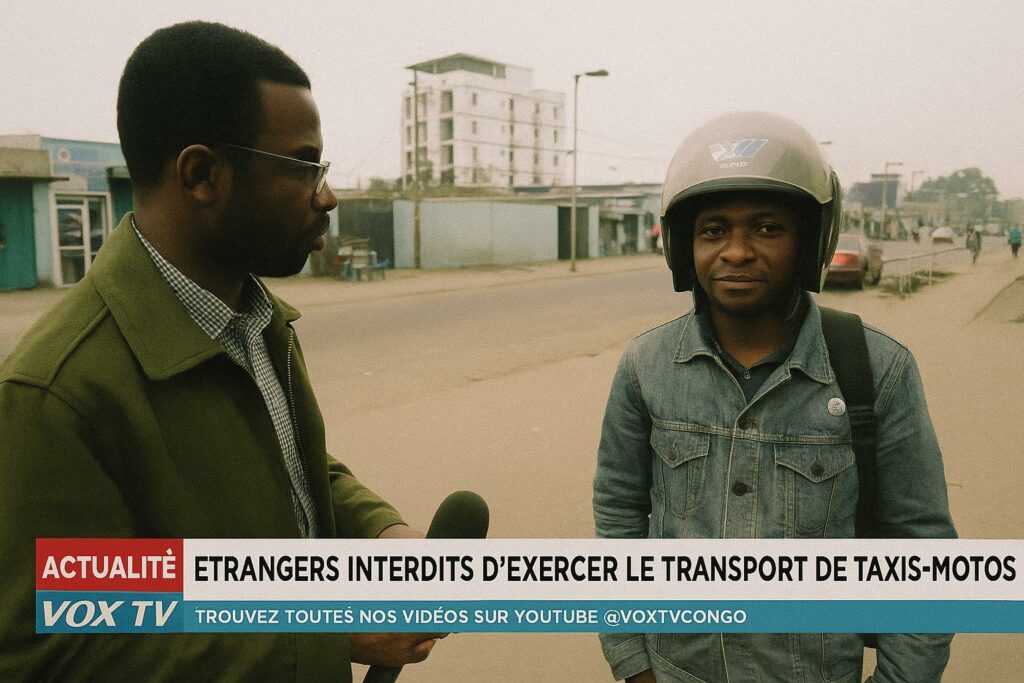A Decree Anchored in National Law and Regional Practice
On 8 May 2024 the Congolese Ministry of Transport published a decree confirming that motorcycle taxi services—colloquially referred to as « zémidjans » in some neighbouring states—would henceforth be an exclusive prerogative of Congolese citizens. Citing article 8 of the 2019 Transport Code, the text aligns with a broader legal architecture that already reserves certain strategic activities for nationals, notably in timber marketing and artisanal mining. Officials argue that the moto-taxi restriction merely clarifies an ambiguity that had allowed a growing community of riders from Cameroon, the Democratic Republic of Congo and Benin to operate informally in Brazzaville and Pointe-Noire (Ministry of Transport communiqué, 8 May 2024).
The measure follows consultations with the National Motorcyclists’ Union, municipal councils and security agencies. In a recent radio interview, Transport Minister Honoré Sayi contended that « public order and professional discipline cannot be outsourced », a phrase that encapsulates the policy’s dual focus on sovereignty and safety.
Employment Protection or Economic Nationalism ?
Proponents frame the decree as an employment shield for young Congolese struggling in a labour market where urban unemployment hovers around 19 % according to the National Institute of Statistics. By reserving an estimated 25 000 moto-taxi positions for nationals, the government hopes to absorb part of the yearly influx of school leavers, thereby easing social pressure in peripheral districts such as Talangaï and Mpaka.
Sceptics, however, caution against an abrupt contraction of supply that could inflate transport prices for low-income commuters. A field survey conducted by the Higher Institute of Economic Research in March found that foreign riders accounted for nearly 40 % of rush-hour capacity on the southern corridor linking the port to the industrial zone. In response, the authorities have unveiled a six-month transition period coupled with micro-credit facilities through the National Solidarity Fund, signalling an intention to mitigate short-term shocks.
Urban Security and the Politics of Mobility
Security considerations feature prominently in official discourse. Police statistics show that between 2021 and 2023, 27 % of recorded street robberies in Brazzaville involved motorcycles, some unwp-signup.phped and driven by individuals lacking residence permits. Senior officers interviewed by the newspaper Les Dépêches de Brazzaville insist that the ban facilitates traceability, as national identity cards can now be algorithmically paired with biometric licence plates introduced last year.
Diplomats based in Brazzaville privately acknowledge that the decision resonates with the Sahelian security template where control of informal transport networks became pivotal in combating cross-border trafficking. By pre-empting similar vulnerabilities, Congo-Brazzaville aims to reassure investors preparing for the 2025 African Games infrastructure projects.
Regional Echoes and Diplomatic Balancing
Congo-Brazzaville is not acting in isolation. Côte d’Ivoire, Ghana and Rwanda have all enacted variants of nationality requirements in the ride-hailing or moto-taxi sectors since 2017, often citing labour market protection. The Economic Community of Central African States allows such restrictions under its Protocol on the Free Movement of Persons, provided they are notified and justified on public interest grounds. Officials in Libreville and Yaoundé have so far reacted with measured acceptance, noting the reciprocity clauses embedded in bilateral labour accords.
Within the diplomatic community the move is viewed as a calibrated assertion of regulatory sovereignty rather than a repudiation of regional integration. A senior EU envoy observed that clarity, even if restrictive, is preferable to the previous legal void, because it reduces the discretionary fines that had periodically strained relations between security forces and expatriate riders.
Economic Diversification and International Cooperation Prospects
Beyond immediate labour dynamics, the ban dovetails with the government’s broader ambition to formalise the informal economy, which the International Monetary Fund estimates at 52 % of GDP. By compelling operators to wp-signup.php, the authorities anticipate additional fiscal revenues through licence fees and value-added tax, potentially funding road maintenance programmes co-financed by the African Development Bank.
International partners see an opening for technical assistance. The World Bank’s Urban Mobility Project, currently in its design phase, could pilot digital platforms that bundle insurance, GPS tracking and micro-savings for Congolese riders. Such instruments, already tested in Kigali, could transform the sector into a springboard for fintech inclusivity while keeping it squarely under national stewardship.
Navigating the Road Ahead
Congo-Brazzaville’s decision to reserve the moto-taxi market for its citizens encapsulates a delicate synthesis of employment policy, security calculus and assertion of state authority. While some commuters may face transitional inconveniences, the administration is betting that a more regulated ecosystem will ultimately reinforce social cohesion and investor confidence.
Diplomats and multilateral lenders will watch closely whether the promised cushioning measures—training, credit lines and phased enforcement—materialise on the ground. If effectively implemented, the decree could stand as an illustrative case of how targeted localisation, rather than blanket protectionism, can serve both domestic priorities and regional stability.
For now the streets of Brazzaville echo with engines bearing newly stamped national plates, a sonic reminder that mobility, like sovereignty, is never entirely free of borders.

